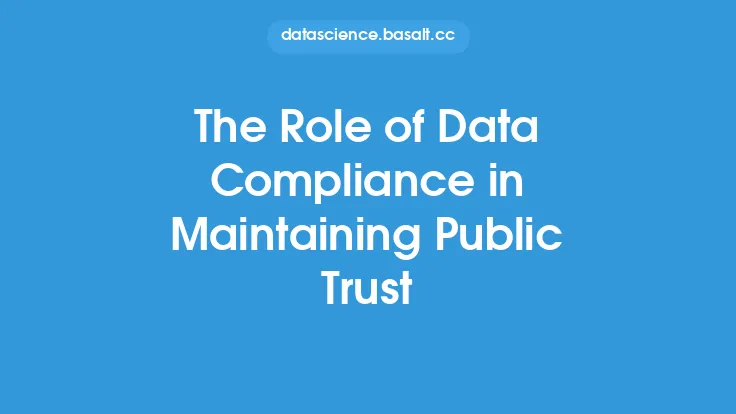In today's digital age, data has become a vital component of any business, and companies are collecting and processing vast amounts of customer data to provide personalized services, improve their operations, and gain a competitive edge. However, this increased reliance on customer data has also raised concerns about data privacy and security. As a result, building trust with customers has become a critical aspect of any business, and data privacy plays a crucial role in achieving this goal.
Introduction to Data Privacy
Data privacy refers to the practices and procedures that organizations use to protect their customers' personal information from unauthorized access, use, or disclosure. It involves ensuring that customer data is collected, stored, and processed in a way that respects their privacy and maintains their trust. Data privacy is not just a moral or ethical obligation; it is also a legal requirement, with various regulations and laws, such as the General Data Protection Regulation (GDPR) and the California Consumer Privacy Act (CCPA), governing the collection and use of customer data.
The Importance of Data Privacy in Building Trust
Data privacy is essential in building trust with customers because it demonstrates a company's commitment to protecting their personal information and respecting their privacy. When customers trust a company with their data, they are more likely to engage with the company, provide feedback, and become loyal customers. On the other hand, a data breach or unauthorized use of customer data can damage a company's reputation and erode customer trust. A study by Ponemon Institute found that 70% of consumers would stop doing business with a company if their personal data was compromised, highlighting the significance of data privacy in maintaining customer trust.
Key Principles of Data Privacy
There are several key principles of data privacy that organizations should follow to build trust with their customers. These principles include:
- Transparency: Organizations should be transparent about the data they collect, how they use it, and with whom they share it.
- Consent: Organizations should obtain explicit consent from customers before collecting and processing their data.
- Data minimization: Organizations should only collect and process the data that is necessary to achieve their purposes.
- Accuracy: Organizations should ensure that customer data is accurate and up-to-date.
- Security: Organizations should implement robust security measures to protect customer data from unauthorized access, use, or disclosure.
- Accountability: Organizations should be accountable for their data privacy practices and have procedures in place to address customer complaints and concerns.
Technical Measures for Data Privacy
In addition to following the key principles of data privacy, organizations can also implement various technical measures to protect customer data. These measures include:
- Encryption: Organizations can use encryption to protect customer data both in transit and at rest.
- Access controls: Organizations can implement access controls, such as multi-factor authentication and role-based access control, to restrict access to customer data.
- Data masking: Organizations can use data masking to hide sensitive customer data, such as credit card numbers and passwords.
- Anonymization: Organizations can use anonymization techniques, such as pseudonymization and anonymization, to protect customer data from identification.
- Secure data storage: Organizations can use secure data storage solutions, such as cloud storage and data warehouses, to store customer data.
Data Privacy and Customer Engagement
Data privacy is not just a compliance issue; it is also a key factor in customer engagement. When customers trust a company with their data, they are more likely to engage with the company, provide feedback, and become loyal customers. A study by Accenture found that 83% of consumers are willing to share their data with companies if they trust them, highlighting the significance of data privacy in customer engagement. Organizations can use data privacy to build trust with their customers and create a positive customer experience.
Data Privacy and Business Benefits
Data privacy is not just a moral or ethical obligation; it also has several business benefits. These benefits include:
- Increased customer trust: Data privacy helps to build trust with customers, which can lead to increased customer loyalty and retention.
- Improved brand reputation: Organizations that prioritize data privacy are seen as responsible and trustworthy, which can improve their brand reputation.
- Competitive advantage: Organizations that prioritize data privacy can differentiate themselves from their competitors and attract customers who value data privacy.
- Regulatory compliance: Data privacy helps organizations to comply with regulatory requirements, such as GDPR and CCPA, which can reduce the risk of fines and penalties.
- Data quality: Data privacy helps to ensure that customer data is accurate and up-to-date, which can improve the quality of data-driven insights and decision-making.
Conclusion
In conclusion, data privacy plays a crucial role in building trust with customers, and organizations should prioritize data privacy to maintain customer trust and loyalty. By following the key principles of data privacy, implementing technical measures, and using data privacy to drive customer engagement, organizations can create a positive customer experience, improve their brand reputation, and gain a competitive advantage. As the digital landscape continues to evolve, data privacy will become an increasingly important aspect of any business, and organizations that prioritize data privacy will be better positioned to succeed in the long term.





